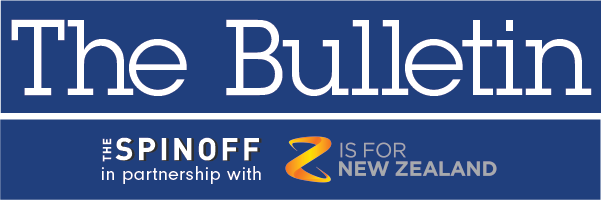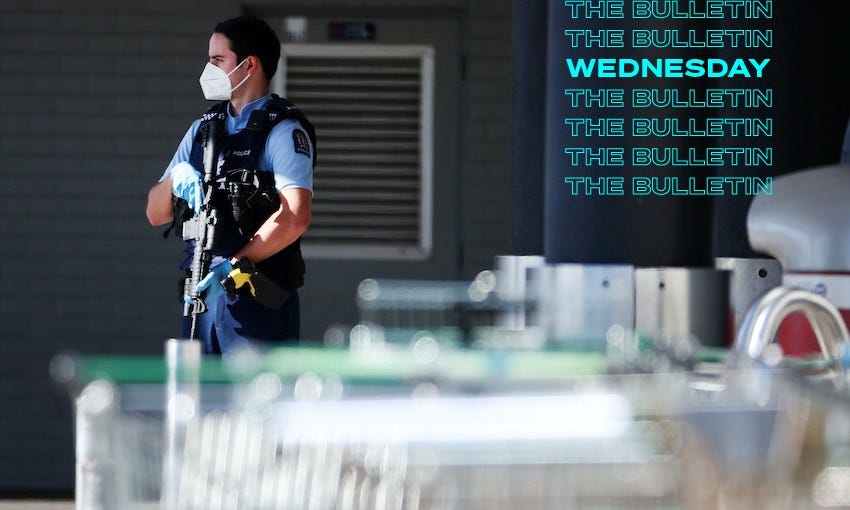A stronger anti-terror law is coming fast
Labour and National are united to pass a counter-terrorism bill by next week, despite opposition in parliament and from legal experts who want to take more time
Mōrena and welcome to The Bulletin for Wednesday, September 22, by Justin Giovannetti. Presented in partnership with Z Energy.
In today’s edition: A vaccine challenge for Auckland as it enters level three, Covid-19 penalties increase, Justin Trudeau’s win, but first, the new counter-terror law.
Armed police at Countdown LynnMall on September 4. (Fiona Goodall/Getty Images)
A new anti-terror law is speeding through parliament. After the terror attack in New Lynn on September 3, the prime minister pledged that the counter-terrorism bill would be pushed through parliament swiftly. It’s an expansive piece of legislation that makes planning a terrorist act, training for one or providing material support to a terrorist a crime. The bill has created odd bedfellows at parliament, with Labour and National coming together in support. Meanwhile Act, the Greens and Te Paati Māori are united in opposition. The government has promised that the bill will pass by the end of the month.
The government says the bill is needed because of the changing face of terror. RNZ reports that justice minister Kris Faafoi said police and intelligence need new legal authority to catch terrorists before they act. “Across the world, we've seen more lone acts or small groups rather than larger organised terrorist groups, and, as we've seen, New Zealand is not immune to these events,” he told parliament yesterday before the bill passed its second reading. According to Faafoi, the government couldn’t consult much on the bill because it would have exposed “a national security risk” if terrorists knew of holes in the law.
Opposition to the bill has been significant, especially with the fast timetable. Green MP Teanau Tuiono warned parliament that previous counter-terrorism laws were often turned on Māori and Pacific communities, citing the 2007 Urewera raids as an example of abuse. “The new planning or preparation offence has been characterised by some experts as thought crimes, difficult to define in practice or defend against in legal proceedings,” he said yesterday.
Even National leader Judith Collins, who is working with the Labour benches, admitted to having some reservations. “I understand that there is concern, very deeply held and genuinely held concern, that this is, essentially, criminalising people who plan a criminal offence,” she said. “The problem is that now that there is communication via the internet and other means, and social media, it is very important that we recognise that things are not the same as they were 10, 20, or even 30 years ago.”
What’s the hurry? The prime minister says the law isn’t being rushed, rather it was first proposed in 2018 and slowly worked its way through the government bureaucracy. There’s a chance that parts of the bill could be changed this week, but the Greens and Act have asked for a delay to get the balance right between stopping terrorists and protecting disadvantaged groups. Former Labour candidate Shane Te Pou suggested in the NZ Herald that the bill needs careful public consideration and not a rush after heartbreak and heightened emotion. Andrew Geddis has also written in The Spinoff that the proposed law might not have stopped the Lynn Mall attack, so hit the brakes.
If you like what you’re reading, we need your support. The Spinoff is doing our utmost to keep you updated on Covid-19 related news. Every dollar our members contribute directly funds our editorial team and is devoted to ensuring we do more. Click here to learn how you can support the team today.
Welcome to level three Auckland.
The city’s challenge now is to get to 90% vaccinated in a fortnight. With about 79% of the city's eligible population having receiving a jab, the prime minister has said increasing that number by 11% in the next two weeks is “ambitious but doable,” according to Newshub. As Auckland moves to level three, the over 20,000 people over the age of 65 who haven't received a dose yet have been asked to remain home until they are vaccinated. Jacinda Ardern and Ashley Bloomfield have now both backed getting to 90% as a goal for the country.
The Covid numbers: 14 new community cases were reported yesterday and 41% (9) of the previous day’s cases were active in the community while infectious. 13 of the cases were in Auckland and 1 was in Upper Hauraki. 1085 cases have now been detected in the delta outbreak and 790 have recovered. 50,196 people were vaccinated on Monday.
The Spinoff’s Covid data tracker has the latest figures.
The maximum penalty for breaching Covid-19 rules will triple to $12,000 after a number of incidents. The prime minister said the lower level of fines previously didn't reflect the severity of breaching the Covid public health act, RNZ has reported. There's been a steady number of infringements reported by police in recent days. A single case, either crossing a regional boundary or escaping a border facility, can cause an outbreak that costs the country billions. The level of fine or jail time rests with police or the courts. An example of an infringement, according to Covid-19 minister Chris Hipkins, is failing to wear a face covering when required.
The most famous pair facing punishment under the Covid-19 act have yet to face charges. According to Stuff, more than 20 people have been charged since the couple who fled to Wānaka were detected, but police haven't explained the delay.
The time tricksters of Te Anau thirst for tourists. The Otago Daily Times reports that an announcement from the South Island town of Te Anau that it would stay at summer time forever, creating a Te Anau standard time of sorts, was really just a publicity stunt. Many New Zealanders don't know where to find the town, which prides itself as the gateway to Fiordland and Milford Sound. Locals want to change that. The campaign promises to continue and also deal with the meaning of time in the future. Stunts aside, doing away with changing the clock twice a year is an idea worth debating.
Some New Zealanders overseas could lose voting rights due to the border closure. The NZ Herald reports that the government has no plans to change an electoral law requiring citizens to be in the country once every three years to retain the right to vote. For non-citizen residents, the requirement is an annual visit. With few spaces available at border facilities and only a gradual reopening expected in the coming years, it’s unclear how many residents could fall off the electoral rolls before the next election in 2023. Local elections are a year earlier. About one million New Zealanders live overseas.
Justin Trudeau to remain Canada’s prime minister. The Liberal leader won a third straight election and will hold onto power, but his party has failed to win a majority, according to the CBC. Trudeau has run a minority government since 2019, which means he has to strike a deal with opposition parties to win every vote in parliament. He called an election last month, two years ahead of schedule, when his party was high in the polls and firmly in majority territory. However, his support bled off during a campaign marked by anti-vaccination protests, the Kabul evacuation and a fourth wave of Covid-19. After five weeks of campaigning, Canadians reelected a parliament nearly identical to the one they elected two years ago.
Trudeau’s gamble to win a majority failed and many voters made it clear during the Liberal leader’s time on the hustings that they didn’t appreciate the early election. While little will change in the capital, he could return to Ottawa weakened by the result. For reasons Canadians themselves don’t quite understand, coalition governments just aren’t seen as a viable option in Canada.
Got some feedback about The Bulletin, or anything in the news?
Get in touch with me at thebulletin@thespinoff.co.nz
David Farrier and the new and improved MIQ website.
Right now on The Spinoff: David Farrier writes about his experience waiting in the new MIQ system and concludes that the transparency just makes it so much worse. George Driver reports NZ's new clean car standard is likely to make cars more expensive and give buyers fewer choices. Collin Tukuitonga argues that the country can't drop Covid-19 elimination while Māori and Pasifika vaccination rates are too low. Kate Hannah gives advice on how to speak to loved ones who are vaccine hesitant. Chris Schulz speaks with the scientists testing the nation's poop for the virus.
Team NZ isn't too keen on the man backing a local American's Cup defence. Stuff reports that the team is speaking publicly about businessman Mark Dunphy reaching out to Americans about staging the regatta in Auckland, he denies the allegation. The team has made it clear they want to know who he is working with to get millions to keep the regatta here. It's getting messy and likely that Dunphy's plan doesn't have much support from the team. The announcement for the next America's Cup venue was planned for last week, but negotiations continue as Spain and Saudi Arabia remain the only know bidders.
That's it for The Bulletin. If you want to support the work we do at The Spinoff, please check out our membership programme.







